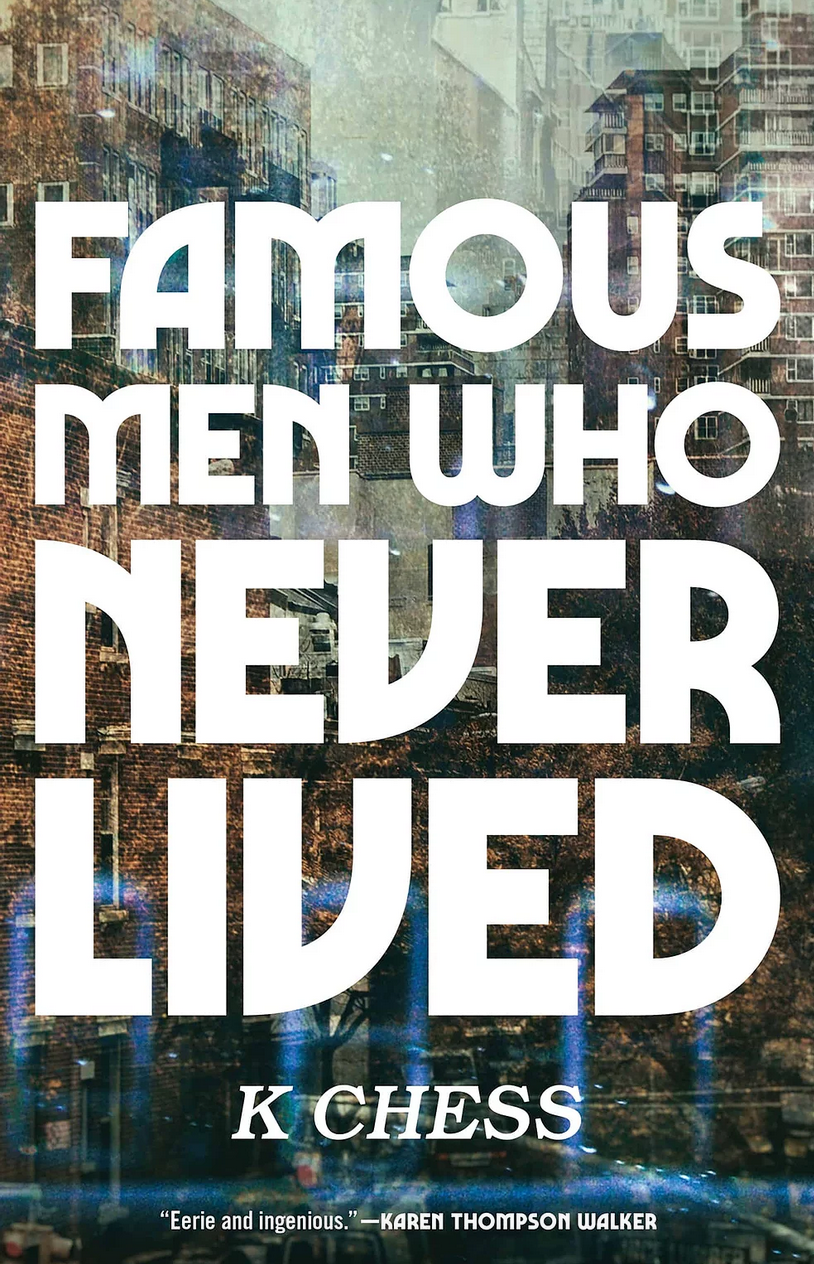Review of K Chess’ Famous Men Who Never Lived
Famous Men Who Never Lived
Tin House Books
March 2019
ISBN: 978-1-947793-24-8
324 pages
reviewed by Emily Webber
In K Chess’ imaginative and timely debut novel, Famous Men Who Never Lived, 156,000 Universally Displaced Persons (UDPs) have traveled through a mysterious opening in the universe to a parallel New York. A lottery system decides which people transfer through “the Gate.” These refugees are fleeing a city that is reeling from nuclear war. In their new New York, they encounter neighborhoods that are sometimes eerily similar to those they have left. Yet slang, technology, and fashions are completely different. Compounding their sense of dislocation, they are met with fear, anger, or indifference. Chess’ novel focuses mainly on Hel and her partner Vikram, both UDPs. Hel finds herself “shipwrecked in a world populated by 7 billion strangers with whom she had nothing in common.”
While Hel defiantly tries to keep hold of the old world, Vikram dutifully attends Reintegration Education Group meetings and eventually befriends a person from the new one. He is content working as a nighttime security guard at a storage center, even though he used to be in academia. However, he still experiences a longing for his former life. When he sees a blue glow coming from one of the storage units, he hopes that it’s another opening in the universe that will provide him and Hel a chance to go back. The only tangible object Hel has from her old world is an apocalyptic science fiction novel, The Pyronauts, brought over by Vikram. The book, written by Ezra Sleight, was a cult classic, but in this New York Ezra drowned as a child, before the worlds split, and never wrote his masterpiece. Hel has also left behind her son and, though it goes mostly unspoken, this loss haunts her.
In addition to telling Hel and Vikram’s stories, the novel includes excerpts from The Pyronauts and transcripts of interviews with UDPs. While most of these sections are engaging, there is one storyline dropped in at the end that seemingly springs from nowhere and that the already-rich novel could do without.
Famous Men Who Never Lived reminds us that not everyone coming to another country wants to leave their home to make a new life. It may seem silly to say that we need this reminder, but currently, when many Americans do not want Syrian refugees resettled in the U.S., it seems we do. At the beginning of Chess’ novel, Hel wishes she would have known to bring over the artifacts that would allow the culture and traditions of her world to persist. She seeks to preserve “the things that had no home outside the memory of her people.” The New York Times recently wrote about how the Holocaust is fading from memory. Like this real-world example, Hel’s struggle against erasure warns us that we must not rely on memory alone. We have a duty to teach and preserve the history of all people, down to individual stories.
There have been apt comparisons of Famous Men Who Never Lived to recent novels such as Station Eleven, American War, and Exit West. For this reader, it also called to mind a much-loved book: The Book of Strange New Things by Michael Faber. Both novels manage to take a science fiction premise we may think we have seen before and give the reader an intimate and beautifully human story that transcends expectations. Both describe what it is like to be somewhere foreign, to try to assimilate, while still attempting to hold on to vestiges of home. Chess’ book succeeds in the same way Faber’s does: by delivering a captivating story that contains meticulous world-building and richly developed characters. This results in a novel that helps us see our world better, encouraging us to examine our responses to refugees and reminding us why we should help others maintain a culture and sense of identity in a new home.
Emily Webber (@emilyannwebber) was born and raised in South Florida where she lives with her husband and son. Her writing has appeared in The Writer, Five Points, Maudlin House, Brevity, and Fourth & Sycamore. She’s the author of a chapbook of flash fiction, Macerated, from Paper Nautilus Press.

